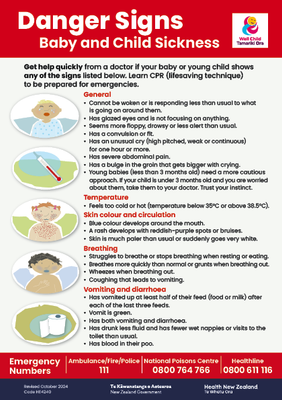Baby and Child Sickness – Danger Signs - English version - HE4240

This resource relates to the following topics:
Two-sided leaflet with English on one side and te reo Māori on the other, describing warning signs of illness in a young child - with a focus on the child's temperature, breathing, vomiting, and diarrhoea.
The full resource:
Get help quickly from a doctor if your baby or young child shows any of the signs listed below. Learn CPR (lifesaving technique) to be prepared for emergencies.
General
- Cannot be woken or is responding less than usual to what is going on around them.
- Has glazed eyes and is not focusing on anything.
- Seems more floppy, drowsy or less alert than usual.
- Has a convulsion or fit.
- Has an unusual cry (high pitched, weak or continuous) for one hour or more.
- Has severe abdominal pain.
- Has a bulge in the groin that gets bigger with crying.
- Young babies (less than 3 months old) need a more cautious approach. If your child is under 3 months old and you are worried about them, take them to your doctor. Trust your instinct.
Temperature
- Feels too cold or hot (temperature below 35°C or above 38.5°C).
Skin colour and circulation
- Blue colour develops around the mouth.
- A rash develops with reddish-purple spots or bruises.
- Skin is much paler than usual or suddenly goes very white.
Breathing
- Struggles to breathe or stops breathing when resting or eating.
- Breathes more quickly than normal or grunts when breathing out.
- Wheezes when breathing out.
- Coughing that leads to vomiting.
Vomiting and diarrhoea
- Has vomited up at least half of their feed (food or milk) after each of the last three feeds.
- Vomit is green.
- Has both vomiting and diarrhoea.
- Has drunk less fluid and has fewer wet nappies or visits to the toilet than usual.
- Has blood in their poo.
Emergency numbers:
- Ambulance/Fire/Police 111
- National Poisons Centre 0800 764 766
- Healthline 0800 611 116
Ngā Tohu Whakatūpato
Ngā matenga tamaiti, pēpi hoki
Kia tere tonu te tiki āwhina i te tākuta mēnā e whakaatu ana tō pēpi, tamaiti rānei i tētahi o ngā tohu ki raro iho nei. Ākona te CPR (tikanga whakaora) kia rite ai koe ina tūpono he ohotata.
Ngā tohu whānui
- Tē taea te whakaoho, kua kore rānei e tino aro atu ki ngā oreoretanga.
- Kua pao ngā karu, kua kore e āta kite.
- Kua memeha te tinana, kua pōuruuru, kua kore rānei e mataara.
- Kua pāngia e te hukihuki.
- Kua rerekē te āhua o te tangi (teitei te rangi, ngoikore, tē mutu rānei) mō
te kotahi hāora, neke atu rānei. - Kua tino mamae te puku.
- Kua kōpuku te tapatapa e rahi haere ana i a ia e tangi ana.
Te ine mahana
-
Kua makariri rawa ia, he kirikā tōna rānei (kei raro tōna pāmahana
i te 35°C, kua neke atu rānei i te 38.5°C).
Te tae o te kiri me te rerenga toto
- Kua kikorangi te waha.
- Ka tipu he kōpukupuku me ngā tūtutupō, marū ranei āhua whero-waiporoporo.
- Kua taitea ake te kiri, kua ohorere rānei te whakateatea.
- Kua kikorangi ngā maikuku, kua taitea, kua tāingoingo rānei te kōnui waewae, kua kore rānei te tae o te kōnui waewae e hoki mai i raro i te toru hēkona ina kutia.
Te hā
- He uaua te whakangā, ka haukoti rānei te hā ina okioki, ina kai rānei.
- Kua tere ake te hā, ka horu rānei ina tukua te hā.
- Ka ngoio ina tukua te hā.
- Te maremare kātahi ka ruaki.
Te ruaki me te torohī
- Kua ruakina te nuinga o ngā kai (he kai, he mīraka rānei) i muri iho i ngā kai e toru kua hipa tata nei.
- He kākāriki te ruaki.
- He ruaki, he torohī hoki tōna.
- Kua iti iho te inuinu, kua iti iho hoki ngā kope mākū, kua ruarua iho rānei ngā haerenga ki te wharepaku.
- He toto ki rō te tiko.
Ngā waea ohorere:
- Waka Tūroro/Patuahi/Pirihimana: 111
- National Poisons Centre: 0800 764 766
- Healthline: 0800 611 116